
Sint-Gertrudis-Pede is a village in Dilbeek.

Sint-Gertrudis-Pede is a village in Dilbeek.
According to local legend, Gertrude of Nivelles, abbess of Nivelles Abbey, was on her way to Lennik when her carriage became stuck in the mud. Therefore, she was obliged to continue her journey on foot. The name Pede would come from the Latin for "on foot".
Sint-Gertrudis-Pede grew around the place where different streams came together to form the Pedebeek, of which the largest is the Laarbeek. Around these streams were three large farms, who originally depended on the abbey of Nijvel, and later on Gaasbeek.
The village never became an independent municipality, however this almost was the case. On 19 May 1893 the motion to create the municipality of Sint-Getrudis-Pede was accepted in the Chamber of Representatives, but was rejected by the Senate. In 1890 it became an independent parish, stretching over the borders of the municipalities of Schepdaal, Itterbeek, Sint-Martens-Lennik and Vlezenbeek.
In 1977 it became part of the municipality of Dilbeek.

Dilbeek is a municipality in the province of Flemish Brabant, in the Flemish region of Belgium. The municipality comprises the villages of Dilbeek proper, Groot-Bijgaarden, Itterbeek, Schepdaal, Sint-Martens-Bodegem, and Sint-Ulriks-Kapelle. Dilbeek is located just outside the Brussels-Capital Region in the Pajottenland, hence the local name Poort van het Pajottenland.
The Pajottenland is a distinct region within the Flemish Brabant province and the south-western part of the Brussels Region of Belgium. The region is located west-southwest of Brussels. The Pajottenland is predominantly farmland, with occasional gently rolling hills, and lies mostly between the rivers Dender and Zenne / Senne. The area has historically provided food and drink for the citizens of Brussels, especially Lambic beers, which are only produced here and in the Zenne valley where Brussels is.

Brussels-Halle-Vilvoorde is a judicial arrondissement encompasses the bilingual—French and Dutch—Brussels-Capital Region, which coincides with the administrative arrondissement of Brussels-Capital and the surrounding Dutch-speaking area of Halle-Vilvoorde, which in turn coincides with the administrative arrondissement of Halle-Vilvoorde. Halle-Vilvoorde contains several municipalities with language facilities, i.e. municipalities where French-speaking people form a considerable part of the population and therefore have special language rights. The arrondissment is the location of a tribunal of first instance, enterprise tribunal and a labour tribunal.

Alena, also known as Alène or Alina, is a Christian saint who was martyred around the year 640. She is sometimes referred to as Alena of Forest, Alena of Brussels, or Alena of Belgium, having died in Forest, Belgium, which is now one of the nineteen municipalities of Brussels.
Itta of Metz, O.S.B. was the wife of Pepin of Landen, Mayor of the Palace of the Kingdom of Austrasia. After his death, she founded the Abbey of Nivelles, where she became a Colombanian nun along with her daughter, Gertrude of Nivelles. Both are honored as saints by the Catholic Church.
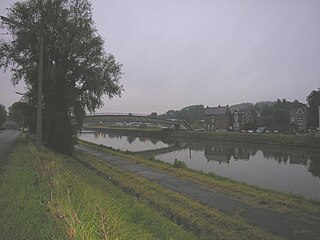
Luttre is a village of Wallonia and a district of the municipality of Pont-à-Celles, located in the province of Hainaut, Belgium, about 15 km north of Charleroi and 50 km south of Brussels along the Charleroi-Brussels Canal, railway line and motorway. Its name means crystal clear water.

Sint Geertruid is a village in the Dutch province of Limburg. It is located the municipality of Eijsden-Margraten.
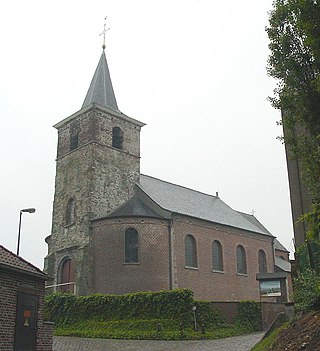
Bogaarden is a village in the municipality of Pepingen, in the Belgian province of Flemish Brabant.

The Gertrudiskerk is a church approachable from the large market in the center of Bergen op Zoom, Netherlands. The towers of the church are called "pepper plant towers". An old legend says Saint Gertrude of Nivelles, abbess of the abbey in Nivelles, founded the church in 654.
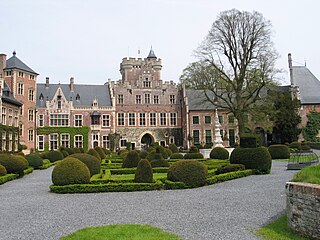
Gaasbeek is a village in the Belgian municipality of Lennik in Flemish Brabant. It is most known for Gaasbeek Castle, which is now a national museum.

Sint-Martens-Bodegem is a historic village that is now part of Dilbeek. It has 2638 inhabitants.
Sint-Ulriks-Kapelle is a village and deelgemeente of Dilbeek, Belgium.

Woluwe-Saint-Lambert or Sint-Lambrechts-Woluwe is one of the 19 municipalities of the Brussels-Capital Region, Belgium. In common with all of Brussels' municipalities, it is legally bilingual (French–Dutch). In French, it is often spelt Woluwé-Saint-Lambert to reflect the Frenchified pronunciation of what was originally a Dutch place name, but the official spelling is without an accent. The Woluwe stream, from which it takes its name, flows through the municipality.

Groot-Bijgaarden is a village and deelgemeente in the municipality of Dilbeek, a suburb of Brussels, in Flanders, Belgium.
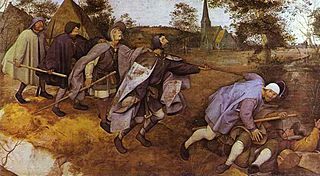
Itterbeek is a historical village in the province of Flemish Brabant, Belgium, and since 1977 a submunicipality of Dilbeek.
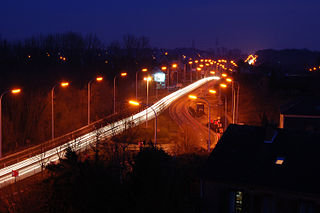
Schepdaal is a village and deelgemeente of Dilbeek in Flanders, Belgium.
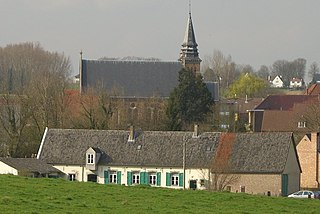
The watermill at Sint-Gertrudis-Pede (Pedemolen) in the municipality of Dilbeek is the only working watermill in the Pajottenland, and is protected as a monument since 1975
Sint-Anna-Pede is a village in Itterbeek, Belgium, which is a deelgemeente of Dilbeek. It gets its name from the Pedebeek, the stream that flows through the village.

St. Anna's Church is a Roman Catholic church in Sint-Anna-Pede, in the municipality of Dilbeek, Belgium, built around 1250. It is depicted in the painting The Blind Leading the Blind by Pieter Breughel the Elder.

Villers-Sainte-Gertrude is a village of Wallonia and a district of the municipality of Durbuy, located in the province of Luxembourg, Belgium. Villers-Sainte-Gertrude has been part of the province of Luxembourg only since 1839. Before that, it was part of the department of the Ourthe. The communities of Deux Rys and Roche à Frêne were attached to it in 1826. It was a fully-fledged municipality before the fusion of municipalities in 1977, and is now part of the Belgian town of Durbuy. The district consists of Grand-Bru and Villers-Sainte-Gertrude and of the localities Moulin des Roches, Hiva and Champs des Cognées.
{{cite web}}: CS1 maint: archived copy as title (link)